Academic writing tools are essential for researchers, students and professionals aiming to enhance the quality, efficiency and clarity of their manuscripts. These tools can streamline various aspects of the writing process, from data analysis and literature search to plagiarism checking and citation management. With the right combination of digital resources, academics can improve their writing, present complex ideas clearly and increase their chances of publication.
This post explores 45 academic writing tools that support different stages of academic writing:
- citations
- data analysis and collection
- illustrations and figures
- literature review
- literature search
- plagiarism check
- publication portfolio
- style guides
- systematic reviews
- writing
- editing services
Academic writing tools for citations
Citing existing literature is an essential part of academic writing. It supports the argument and findings, contextualises them within a broader scientific landscape and illustrates the contribution to the field. However, manually keeping track of the in-text citations, footnotes/endnotes, and bibliography can be daunting and messy. This is especially relevant if the target journal or press uses a different citation style than you are used to. Fortunately, citation managers such as Endnote, Jabref, Mendeley or Zotero can help students and researchers cut time and ensure consistency with the preferred citation style.
Endnote
- Compatible with Microsoft Word and Apple Pages
- Browser plugin for Firefox, Safari and Chrome
- Desktop app compatible with Windows and iOS
- 7,000+ styles, including main ones like APA or Chicago, and even specific journals’ in-house styles
- Pricing: one-time purchase licence from $275 or student licence for $150
Jabref
- Compatible with Microsoft Word, LibreOffice and LaTex
- Browser plugin for Edge, Safari, Vivaldi and Chrome
- Desktop app for Windows, Linux and iOS
- It supports various citation styles through integration with LaTeX and BibTeX, including APA, Harvard and Chicago
- Free and open-source
Mendeley
- Compatible with Microsoft Word
- Browser plugin compatible with Chrome
- Desktop app for Windows, Linux and iOS
- APA, MLA and Harvard citation styles included
- Free
Paperpile
- Compatible with Microsoft Word and Google Docs
- Cloud sync with Google Drive
- Google Scholar, PubMed and ArXiv import integration
- Zotero and EndNote import/export integration
- APA, MLA, Chicago and other major styles citations
- Pricing: Academic $2.99 per month or Business $9.99 per month, billed annually
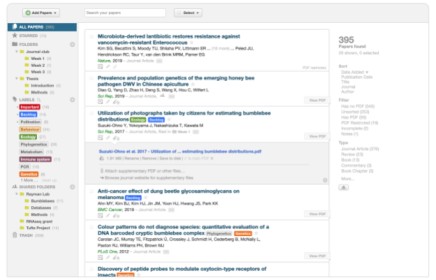
Zotero
- Compatible with Microsoft Word, LibreOffice and Google Docs
- Browser plugins for Chrome, Firefox, Safari and Edge
- Desktop app for Windows, Linux and iOS
- 10,000+ citation styles included
- Free and open-source
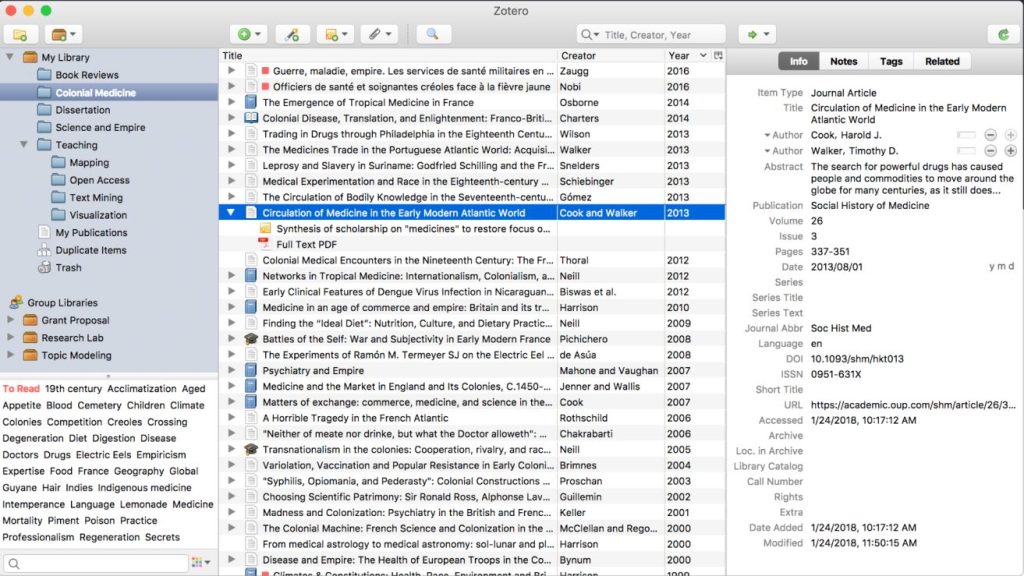
Academic writing tools for data analysis and collection
In academic writing, data collection is a crucial step in research. It involves gathering information from various sources and analysing them to form conclusions. However, the process can be time-consuming and complex, especially when dealing with large amounts of data. But with the help of modern technology, data collection has become more accessible and efficient. Quantitative, qualitative and mixed-methods research data can now be collected and analysed using Atlas.ti, JASP, Otter and other data collection software.
Atlas.ti
ATLAS.ti is a computer-assisted qualitative data analysis software that facilitates the analysis of qualitative data for qualitative research, quantitative research and mixed-methods research. For instance, Atlas.ti can be used with interviews, focus groups, literature reviews, user research and survey data.
- Desktop app compatible with Windows and iOS
- Pricing: student (1 year) for $120, commercial (1 year) for $660
Dedoose
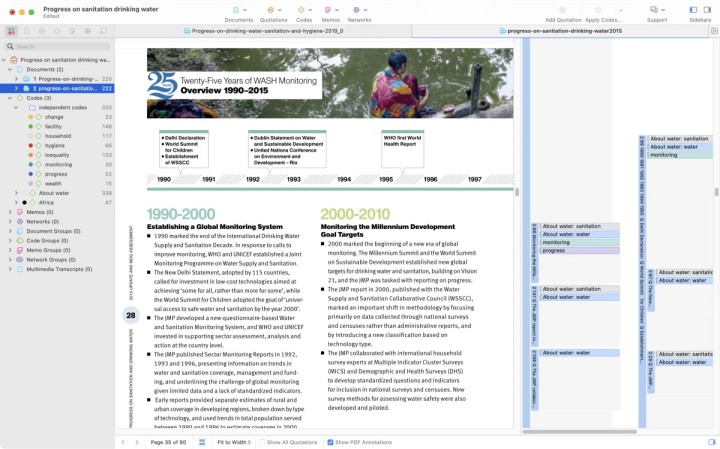
Dedoose is a web-based application for qualitative and mixed-methods research working with text, audio or video data. For instance, it is commonly used in psychology, sociology or anthropology.
- Cloud-based
- Pricing: individual for $17.95 or student for $12.95 per month
Google Dataset Search
Google Dataset Search is a tool that helps users locate datasets. It indexes datasets from various sources, including universities, governments and other organisations, making it easier to find structured data relevant to academic research or analysis. Users can search for specific topics, keywords or fields of study and view the dataset’s metadata, such as its creator and publication date.
- Data available in various formats, including CSV, Excel, JSON, XML, RDF and SQL
- Free
GraphPad Prism
GraphPad Prism is commonly used for statistical analysis and graphing of quantitative data. Its key features include statistical analysis, graphing and curve fitting. Furthermore, Prism is widely employed by researchers, scientists and students in various disciplines, including biology, medicine and social sciences.
- Desktop app compatible with Windows and iOS
- Pricing: student for $142 or academic for $480 per year (for 2 seats)
JASP
JASP is an open-source project supported by the University of Amsterdam. In recognition of Bayesian pioneer Sir Harold Jeffreys, JASP stands for Jeffreys’s Amazing Statistics Program.
- Desktop app compatible with Windows, Linux and iOS
- Free
NVivo
NVivo is a software for qualitative data analysis; it helps qualitative researchers describe, evaluate and interpret social phenomena. For example, they can use NVivo to analyse data from interviews, surveys, field notes, web pages and journal articles and work in sectors from social science sciences such as anthropology, psychology, communication, sociology and education, healthcare, business, forensics, tourism, criminology and marketing. Furthermore, Nvivo works with text, audio, video, emails, images, spreadsheets, online surveys, web content and social media.
- Desktop app compatible with Windows and iOS
- Pricing: $118–$2,038
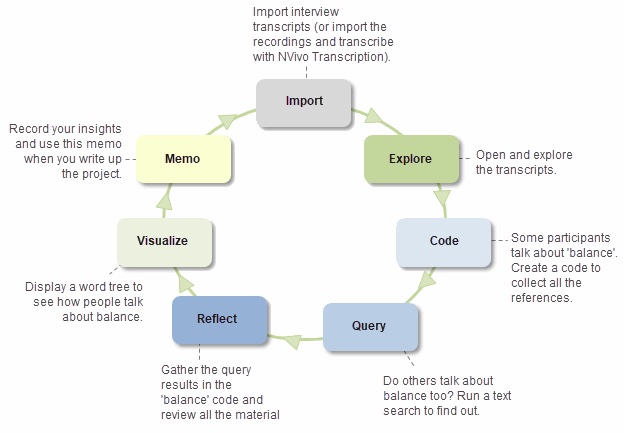
Otter.ai
Otter.ai uses AI natural language processing technology to convert human speech into text, thus eliminating the process of manual note-taking. Among other applications, Otter.ai can be used for transcribing in-depth interviews and focus groups with research participants, meetings with colleagues and much more.
- Mobile app for Android and iPhone
- Pricing: Free or Pro for $8.33 per month (billed annually)
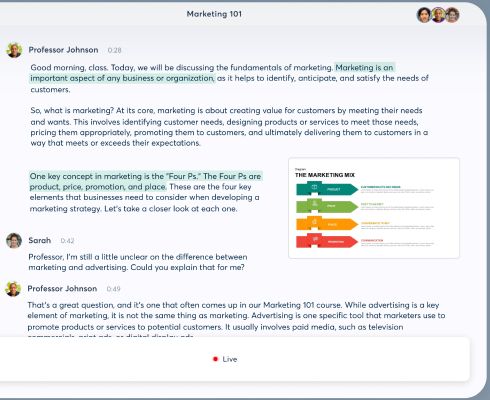
SPSS
SPSS (Statistical Package for the Social Sciences), also known as IBM SPSS Statistics, is a software used to analyse statistical data. For instance, you can use SPSS to prepare and analyse data through an intuitive user interface without writing code using drag-and-drop. In particular, SPSS allows you to run descriptive statistics and regression analyses, view patterns of missing data and summarise variable distributions with an integrated interface.
- Pricing: $99 per month for cloud-based subscription; GradPack from $35 (Base subscription for 6 months)
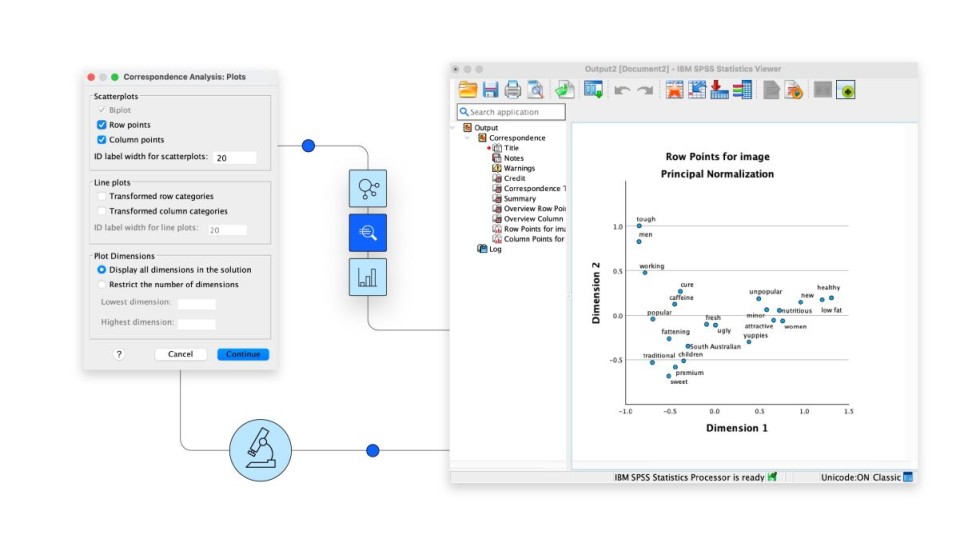
Academic writing tools for illustrations and figures
Academic writing may require illustrations and figures to better communicate complex ideas. Nevertheless, creating high-quality illustrations and figures can be a daunting and expensive task, especially for students and researchers unfamiliar with the relevant software tools. Fortunately, various academic writing tools, including BioRender, Canva, Draw.io or Mermaid.js, can help users create professional-looking illustrations and figures.
BioRender
BioRender contains 50,000+ icons designed by science illustrators and 5,000+ templates in 30 fields of social sciences. Additionally, all content is reviewed for scientific accuracy.
- Pricing: free, academic for $35 or lab for $99 for a per month (billed annually)

Canva
Canva is more suited for design and marketing use since its functionality revolves around creating visuals for social media platforms. Still, for academics, it may offer a cheaper alternative to more academic-oriented tools, like BioRender.
In addition, Canva offers 250,000+ free templates, 100+ design types (social media posts, presentations, etc.), over 1 million free photos and graphics, AI-powered design tools and cloud storage.
- Pricing plans: Free plan or Pro for $15 per month
Draw.io
Draw.io is an online tool for diagramming. Unfortunately, it does not offer templates, but it has received positive reviews online for its intuitive and beginner-friendly interface.
- You can save your designs to Google Drive, OneDrive, Dropbox, GitHub, GitLab or your device
- Free
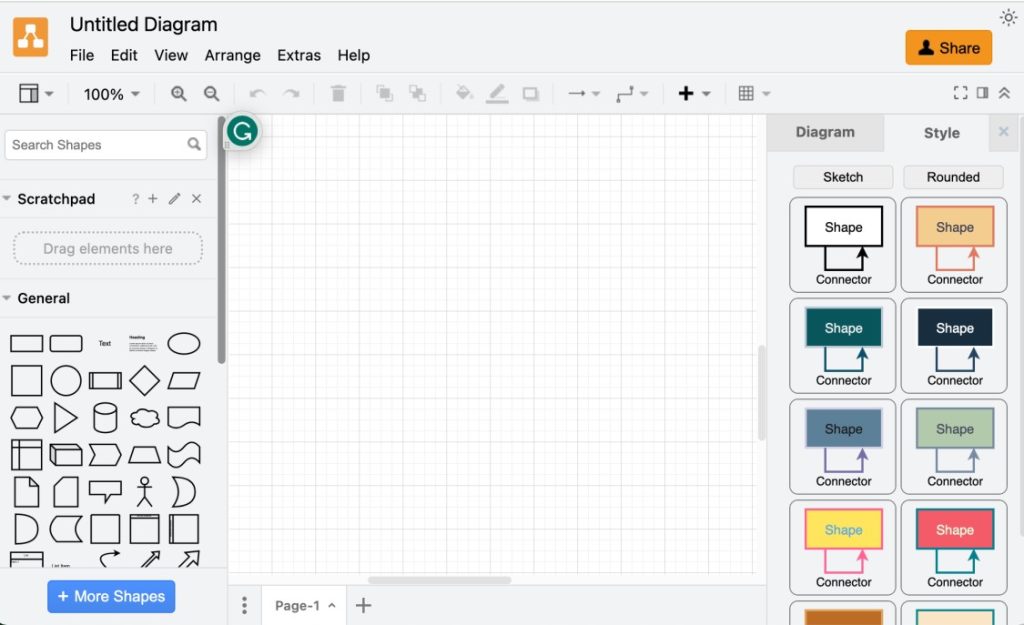
Inkscape
Inkscape is a free and open-source desktop application offering a vector graphics editor. It supports a wide range of file formats for both import and export. It is suited for creating and editing academic and scientific figures and diagrams due to its precision and versatility.
- desktop application for Windows, macOS and Linux
- free and open-source
- supports SVG, PDF, EPS, PNG and AI formats
Mermaid.js
Mermaid is an online JavaScript-based diagramming and charting tool for creating diagrams and visualisations with text and code. Furthermore, it has extensive documentation and tutorials to support new users.
- Browser plugin for Chrome, Firefox, Opera and Edge
- Plugin integrations with GitHub, WordPress, Draw.io, Google Docs and several other platforms
- Free
Academic writing tools for literature review
Literature review helps contextualise research within a broader scientific landscape and demonstrate the contribution of a paper or book to the field. Nevertheless, conducting a literature review can be time-consuming, especially when dealing with a large amount of literature. Still, several tools and software, such as LitMaps R Discover or Scite.ai, can help academic writers streamline the literature review process, making it easier to collect, analyse and present the necessary information.
LitMaps
LitMaps is a catalogue of 260+ million papers. Its Seed Map function displays how a paper is situated within the broader literature and helps find new, relevant papers to dive into. It provides visualisation of the literature maps and literature discovery tools. In addition, it allows sharing the literature map to social media and exporting it as a link or an image included in the research paper.
- Pricing: Free or Pro for $10 per month (billed annually)
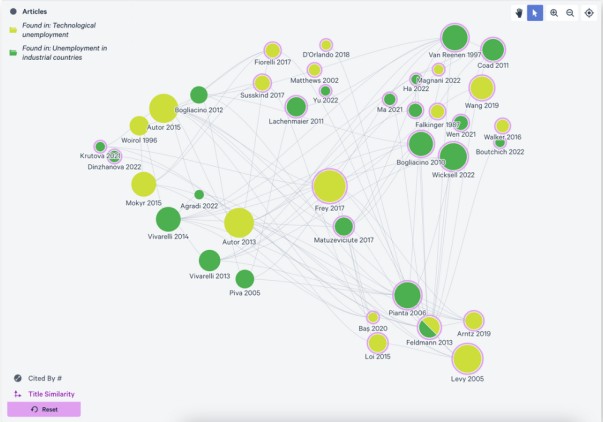
R Discovery
R Discovery Database is an academic research repository with 115+ million research articles, including 40+ million open-access articles. Abstracts and summaries can be translated into 30+ languages. They are also available as audio. This tool also helps collaborate on reading lists.
- Free Google Play and App Store app
- Pricing: Free or Prime for $54 per year
Research Rabbit
Research Rabbit is an AI-powered tool designed to streamline literature searches and provide personalised paper recommendations. It helps researchers discover, organise and stay updated with academic papers through visualised networks of papers, authors and co-authorships. Key features include personalised digests of relevant papers, interactive visualisations of academic networks and collaboration tools that allow users to share and comment on paper collections.
- Free
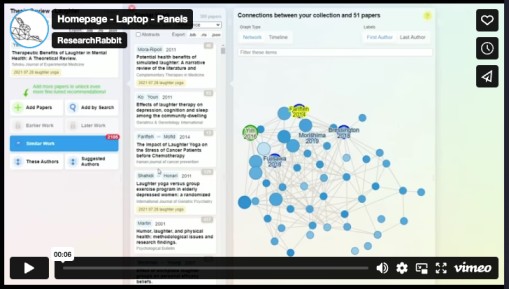
Scite.ai
Scite.ai is a platform for discovering and evaluating scientific articles via Smart Citations. Smart Citations allow users to see how a publication has been cited by providing the context of the citation and a classification describing whether it provides supporting or contrasting evidence for the cited claim.
Importantly, Scite.ai includes 1.2 billion citation statements extracted and analysed and 187 million articles, book chapters, preprints and datasets.
- Zotero integration
- Browser plugin for Chrome
- Pricing: $20 per month or $120 per year
Academic writing tools for literature search
Literature search involves finding and evaluating relevant scholarly articles, books and other publications on a particular topic. Conducting a comprehensive literature search requires understanding the databases and search engines used in the field and the ability to critically evaluate the relevance and quality of the sources found. Nowadays, various academic writing tools are available to help researchers and students streamline the literature search process and ensure they are using high-quality sources, such as Research Rabbit, Elicit, Google Scholar or PubMed.
Elicit
Elicit is an AI research assistant that automates time-consuming research tasks like summarising papers, extracting data and synthesising the findings.
- Pricing: Basic (free) or Plus for $10 per month (billed annually)
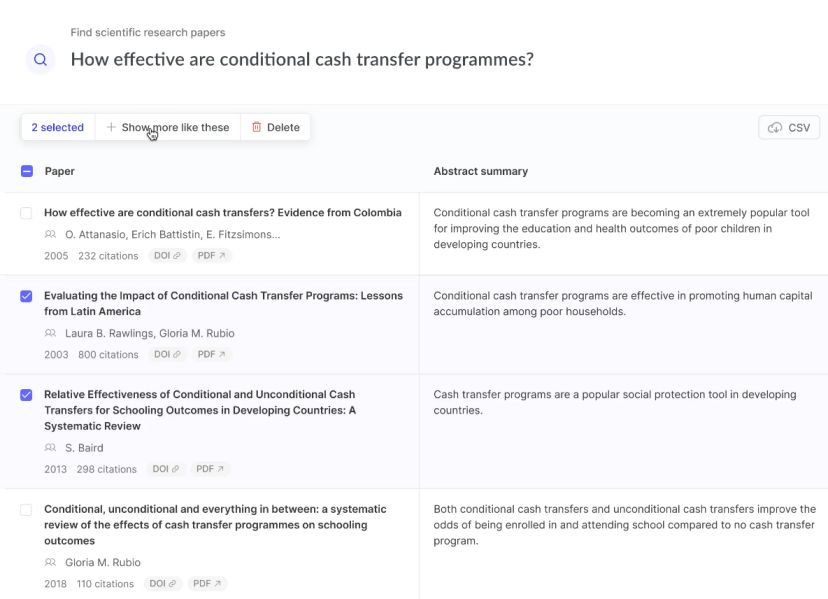
Google Scholar
Google Scholar is a web search engine that indexes the full text or metadata of scholarly literature across an array of publishing formats and disciplines.
- Free
PubMed
PubMed is a resource supporting the search and retrieval of biomedical and life sciences literature. It contains more than 36 million citations and abstracts of biomedical literature. However, it does not include full-text journal articles.
- Free
Academic writing tools for plagiarism check
Plagiarism is a serious offence in academic writing and can have severe consequences for students and researchers. To avoid it, writers must ensure that their work is original and properly cited. Fortunately, there are a variety of academic writing tools, such as Grammarly, Crossref Similarity Check or QuillBot’s plagiarism checker, that can help users check their work for plagiarism and ensure that they have properly cited all sources.
Grammarly
Grammarly’s plagiarism checker detects plagiarism in a text and compares it to billions of web pages and academic papers stored in ProQuest’s databases.
- Free
Crossref Similarity Check
Similarity Check is provided by Crossref and iThenticate editors with a user-friendly tool to help detect plagiarism.
- Pricing: an annual service fee and a per-document checking fee
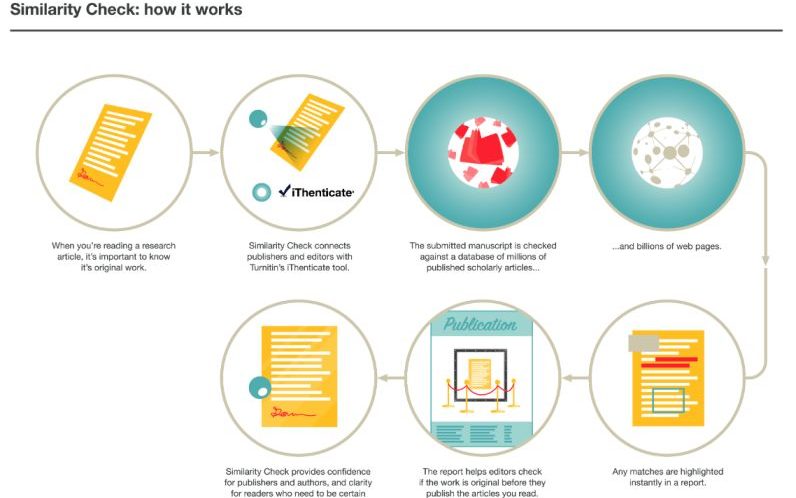
Quetext
Quetext is an online plagiarism detection tool with the DeepSearch feature. It also checks for missing citations and does a basic grammar check.
- Free (500 words per search) or $99.95 per year
QuillBot’s plagiarism checker is included in its premium plan. It analyses whether any section of a text did not properly attribute authorship to content already published online or in books, research and academic papers or news sources. Moreover, it searches texts written in 100+ languages.
- $99.95 per year
Academic writing tools for creating publication portfolio
A publication portfolio includes a list of publications, conference presentations and other scholarly activities and may serve as a basis for academic advancement, grants and other opportunities. However, creating and maintaining a publication portfolio can be time-consuming and challenging, especially for researchers with numerous publications to keep track of. Fortunately, various academic writing tools, such as ResearchGate, Google Scholar Profiles and ORCID, are available to help users create and manage the publication portfolios.
Google Scholar Profiles
Creating a Google Scholar Profile is a simple way to showcase the academic publications for free.
- Free
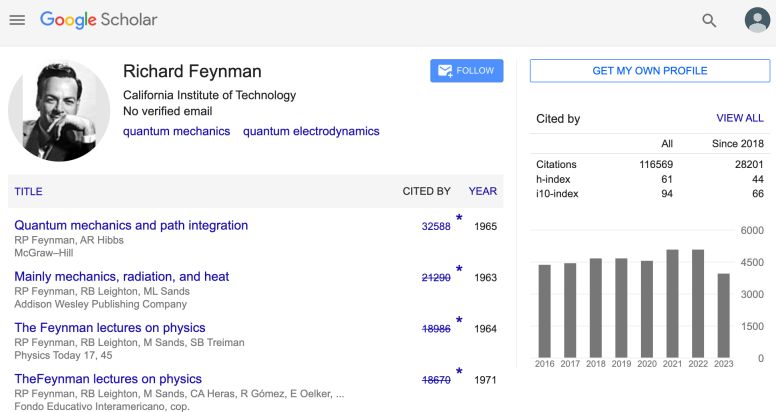
ORCID
ORCID (Open Researcher and Contributor IDentifier) provides a digital identifier (an ORCID iD) a researcher can connect with their professional information — affiliations, grants, publications, peer review and more. Furthermore, they can use the iD to share the information with other systems, ensuring recognition for all relevant contributions.
- Free
ResearchGate
ResearchGate is a social networking site for scientists and researchers to share papers, ask and answer questions and find collaborators. As of 2024, it associates 25 million researchers in over 190 countries.
- Free
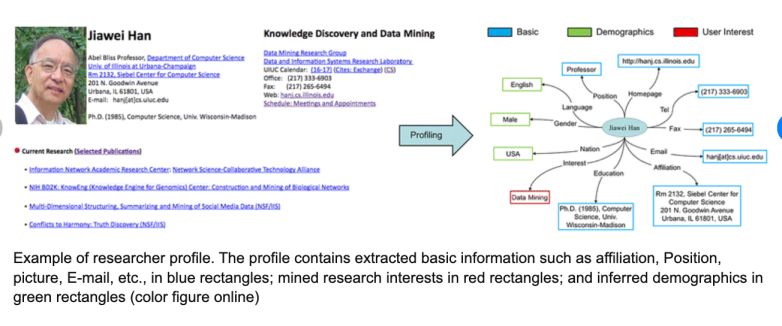
Academic writing tools for following a style guide
Style guides are collections of conventions and rules guiding every language decision concerning the text, from punctuation and spelling word choice to format gathered into one database. In a nutshell, their primary purpose is to ensure that all documents in a given environment present a consistent look and use of language. Style guides offer different guidelines for specific areas, such as:
- citations
- punctuation
- capitalisation of heading
- compound words
- abbreviations and acronyms.
APA style
Publication Manual of the American Psychological Association (APA) style guide comprises a set of standards to make scientific writing easier to understand, including grammar, spelling, punctuation and usage guidelines. Moreover, it developed its signature in-text citation style, ethical standards for publishing research and guidelines on how to format an academic paper. Academic social, medical and natural sciences and humanities commonly follow the APA style guide.
| In-text citation | (Anderson, 1983) |
| Bibliography | Anderson, B. (1983). Imagined communities: Reflections on the origin and spread of nationalism. Verso. |
- Pricing (7th edition): ebook $23.34, paperback $32, spiral-bound $45 or hardcover for $55
The Bluebook
The Bluebook: A Uniform System of Citation is the style guide for legal citation published in 1926. It explains how to cite court cases, constitutions, statutes, legal codes, reports, periodicals, government documents and many other types of texts that serve as sources in legal writing.
However, the Bluebook does not function as an independent style guide or provide guidance on abbreviations, punctuation or capitalisation in general.
- Pricing: online subscription for $39 per year or $46 for a print version
CMOS
Chicago Manual of Style (CMOS) was developed by the Chicago University Press in 1906 and updated 18 times since, most recently in September 2024. It offers standards for writing in commercial and academic publishing and is one of the most widely used style guides. For instance, it includes detailed recommendations for grammar, spelling, punctuation and usage, manuscript formatting and two variations of source citation:
- notes and bibliography
- author-date (with in-text citations similar to APA)
| Date-author system | |
| In-text citation | (Anderson 1983, 12) |
| Bibliography | Anderson, Benedict. 1983. Imagined Communities: Reflections on the Origin and Spread of Nationalism. Verso. |
| Notes and bibliography style | |
| Footnote/endnote | First mention: 1 Benedict Anderson, Imagined Communities: Reflections on the Origin and Spread of Nationalism (Verso, 1983), 26. Following mentions: 2 Anderson, Imagined Communities, 98–100. |
| Bibliography | Anderson, Benedict. Imagined Communities: Reflections on the Origin and Spread of Nationalism. Verso, 1983. |
- Pricing (18th edition): online subscription for $44 per year or a print version for $75
IEEE style
The Institute of Electrical and Electronics Engineers (IEEE) Editorial Style Manual for Authors contains a formal set of editorial guidelines for IEEE journals and other publications, including:
- punctuation
- capitalisation
- abbreviations
- section headings
- numbers and equations
- footnotes and bibliographies.
The IEEE style guide is available free of charge.
Similarly to the Bluebook, the IEEE style guide is not an independent and comprehensive style guide. It uses the Merriam-Webster spelling and for guidance on grammar and usage not included in the IEEE Editorial Style Manual, it recommends the CMOS guidelines.
| In-text citation | [1] |
| Bibliography | [1] B. Anderson, Imagined communities: reflections on the origin and spread of nationalism. Verso, 1983. |
MLA style
Modern Language Association of America (MLA) Handbook primarily established guidelines for citation and formatting in academic papers in humanities, particularly literature and language research. This style focuses on source citations and provides limited guidance on writing mechanics, with no recommendations for language usage. Since 1977, MLA has published nine editions of the Handbook.
| In-text citation | (Anderson 66) |
| Bibliography | Anderson, Benedict. Imagined Communities: Reflections on the Origin and Spread of Nationalism. Verso, 1983. |
- Pricing (9th edition): ebook $28, paperback $38, hardcover $50
Academic writing tools for systematic reviews
Systematic reviews require considerable time and effort to complete. Thankfully, academic writing tools, such as Covidence, Rayyan or RevMan, can help researchers organise their work and produce well-written, comprehensive reviews.
Covidence
Covidence streamlines evidence synthesis with a process for creating systematic reviews. For instance, it allows collaboration with the whole review team in various sectors, including health, education and social sciences.
- Integration with EndNote, Zotero and Mendeley
- Pricing: Single for $289 or Package for $867 per year
Rayyan
Rayyan helps work remotely and collaborate with a distributed research team. Over 500,000 students, librarians and researchers from 180 countries use Rayyan for systematic reviews.
- Integration with Mendeley
- Online, offline and mobile app access
- Pricing: free or professional for $8.33 or student for $4.99 per month (billed annually)
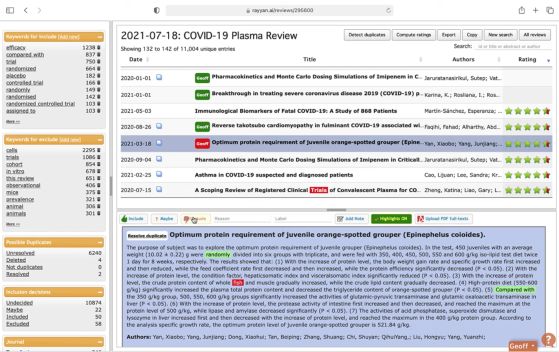
RevMan
RevMan (ReviewManager) facilitates the preparation of protocols and full reviews, including text, characteristics of studies, comparison tables and study data. Furthermore, it can perform a meta-analysis of the data entered and present the results graphically.
- Pricing: standard for £100, academic £85 or student £65 per year (VAT excluded)
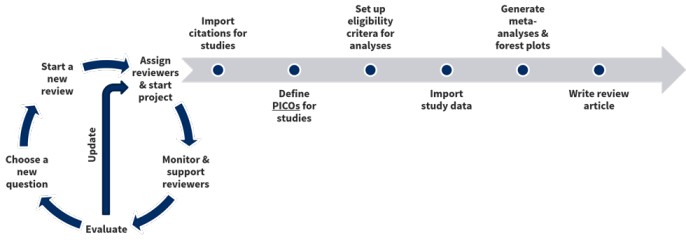
Academic writing assistants
Academic writing asisstants help users refine their writing skills, improve the quality of their work and save time by automating repetitive tasks.
Grammarly
Grammarly is a writing assistant that ensures the text is written without mistakes and meets the preferences concerning the intended audience, formality, domain and intent of the text. In addition, it has an AI assistant (called GrammarlyGO) to generate text based on the prompts.
- Compatible with Microsoft Word and Google Docs
- Browser plugins for Chrome, Edge, Firefox and Safari
- Desktop app for Windows and iOS
- Mobile app for Android and iPhone
- Language localisation: Australian, Canadian, Indian, US and UK English
- Pricing: Free and Premium for $12 per month (billed annually)
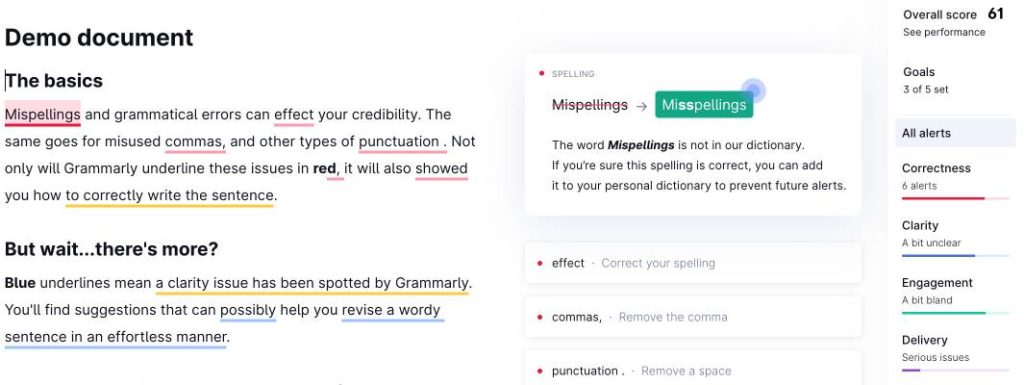
Hemingway Editor
Hemingway Editor is a writing and editing tool designed to help users improve the clarity, readability and conciseness of their writing. It highlights complex sentences, passive voice, adverbs and other potential areas for improvement.
- Pricing: web-based version is free; desktop app is $19.99 (one-time purchase)
- iOS and Windows compatible
Jenni.ai
Jenni is an advanced AI writing assistant that helps you produce content faster, including essays and research papers. Its features include Autocomplete, Paraphrase and Rewrite, Outline Builder and Custom Styles and Tones.
- APA, MLA, IEEE and Harvard citation styles included
- Pricing: Free or Unlimited for $12 per month (billed annually)
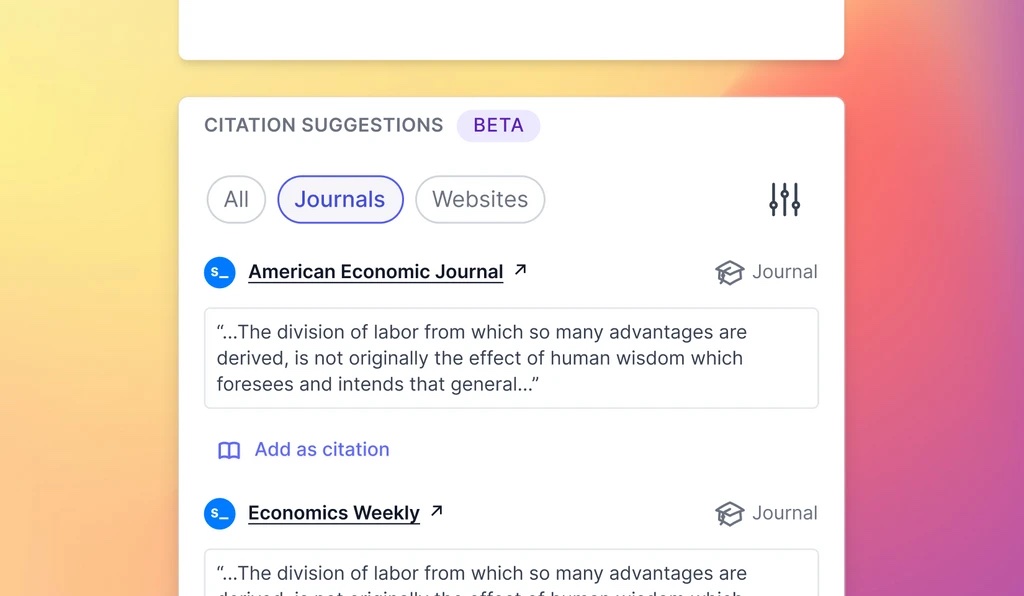
Paperpal
A writing assistant, Paperpal’s AI understands academic context, flags complex language and grammar errors and suggests improvements.
- Text editor compatibility with Microsoft Word and online editor
- An academic translation tool powered by DeepL can detect content written in 25+ foreign languages and translate it to English
- Mobile app compatible with Android and iPhone
- APA, CMOS and MLA citation styles included
- Language localisation: Australian, Canadian, Indian, US and UK English
- Pricing: Free or premium for $139 per year
QuillBot
QuillBot is a paraphrasing and summarising tool that claims to help students and professionals cut their writing time by more than half using AI to rewrite any sentence, paragraph or article.
- Other features include a translator, grammar and plagiarism checker and co-writer
- Compatible with Microsoft Word
- Language localisation: Australian, Canadian, US and UK English
- Browser plugins for Chrome
- Desktop app for iOS
- APA and MLA citation styles included
- Mobile app compatible with Android and iPhone
- Pricing: Free or premium for $99.95 per year
Final thoughts
In summary, academic writing is a highly specialised area of writing that requires precision, clarity and accuracy. However, with the help of modern tools and software, academic writers can improve their writing and presentation of evidence and arguments.
This blog post explored a range of academic writing tools that can aid in citations, data analysis, data collection, literature review, literature search, plagiarism check, publication portfolio, style guides, systematic reviews and writing. With these tools, academic writers can increase their chances of getting published in a high-ranking academic journal or having their book accepted by a reputable academic press.
As an editor and indexer, I routinely work with academic writers, preparing their texts for publication in academic journals and presses. If your academic manuscript needs a second pair of eyes, you can also ask me for a free sample edit (and remember to use my early bird discount).


